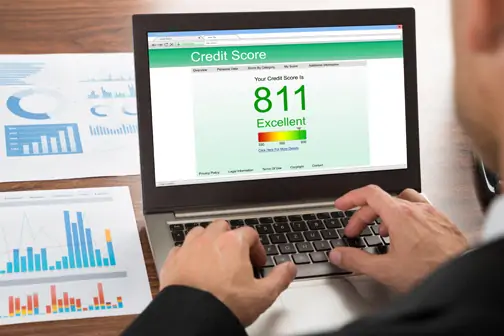
Many people are unaware that getting approved for a loan and the applicable interest rate at which they get the loan are dependent on many factors other than the regular income or repayment capacity. One of the key factors banks look at before they sanction a loan is the credit score. Your credit score, which is part of your credit report, is a 3 digit number between 300 and 900 which provides a snapshot of how well you have dealt with credit i.e. loans and credit cards in the past. At present, credit reports in India are prepared by 4 companies – Experian India, Equifax India, CIBIL TransUnion and CRIF Highmark.
The credit bureaus receive records of every individual’s payments related to credit products such as credit cards and loans from banking institutions and NBFCs in India. These records are submitted every month to Experian, CIBIL and others by member banks and credit associations. Based on the data obtained from these financial institutions, the calculation of your credit score is made based on the proprietary algorithm of each credit information company. Though your score may vary from one credit bureau to another, the core element of calculating your credit score is your loan repayment behaviour. This consists of several important factors such as:
- Past Performance: This is a record of previous debt obligations of the individual and how they were serviced. It is considered as the most important criteria to arrive at the score and contributes significantly to the final score.
- Credit Type and Duration: This also has the potential to significantly impact your credit score. In your credit report, the credit history of the individual includes details of all types of secured or unsecured loans. A higher amount of unsecured debt is perceived as risky by lenders due to increased chances of default, whereas, greater the duration of existing credit, the lower the risk perceived by the lender.
- Credit Exposure: This refers to the total amount of credit granted to the borrower by the lender. Also termed as the credit utilisation ratio, this is a ratio of the total credit available to the borrower vs. the total outstanding balance across all loan accounts. A higher credit utilization ratio shows that the borrower is credit hungry and this can lead to rejection of new credit card or loan applications.
- Others: Factors such as recent successful or rejected credit card/loan applications, previous loan/credit card payment defaults, etc. also play a key role in determining your credit score.
All these factors contribute to an individual’s CIBIL score, which in turn shows whether he or she is eligible for a credit card or loan.
A credit score such as CIBIL score or Experian score has a range between 300 and 900. There is no minimum score that ensures your loan will be approved. As per available data, applicants with a score above 750 have a higher chance of qualifying for new loans and credit cards. In fact, as per publicly available records of CIBIL TransUnion, 79% of the loans approved are for individuals with a score greater than 750. A higher credit score can also get you a preferred lower interest rate and a longer loan repayment period or in some cases even a waiver on the processing fees.
That said, banks may also consider an applicant with a score below 750 for unsecured loans such as personal loans but in such cases the rate of interest applicable may be higher, tenures shorter and approved amount may be lower in order to decrease the bank’s risks from extending the loan. The applicant may also have to show additional proof of his or her ability to pay the EMIs, such as their investments, NSC certificates, life insurance policies and so on. So it is best to check your credit score before you apply for a loan or credit card.
The following are some credit score related pointers that can help you when applying for a credit card or a loan such as a personal loan.
- Make sure that you have a high credit score before applying for a loan. Rule of thumb – the closer your credit score is to 900, the better your chances. You can apply for a free Experian credit report online on Paisabazaar.com. In case you have a low credit score, you can seek a co-applicant for loans such as home loans. However keep in mind that your co-applicant needs to be a close family member and have a high credit score to get the loan sanctioned.
- Do not apply for multiple loans and credit cards simultaneously. This sort of credit hungry behaviour is considered to be a sign of high risk and possible default. Banks may consider you ineligible for a loan as they will be wary of your ability to cater to multiple debt obligations on a regular basis. Moreover, rejection of new loan/credit card applications adversely impacts your credit score.
- Make timely payments of all your existing debt obligations – loan EMI and credit card dues. If you feel that a current loan or credit card features a high rate of interest, look for options to transfer your loan or credit card balance to a different bank/credit card. This way you can continue to pay off your debts, while incurring lower rates of interest on it.
All said and done, the most important fact to remember is that you credit score is dependent on your credit history. If you are a financially-disciplined individual who has serviced debts in a timely manner, you have good chance of having a high credit score as opposed to someone who has been less responsible when paying off existing debts.